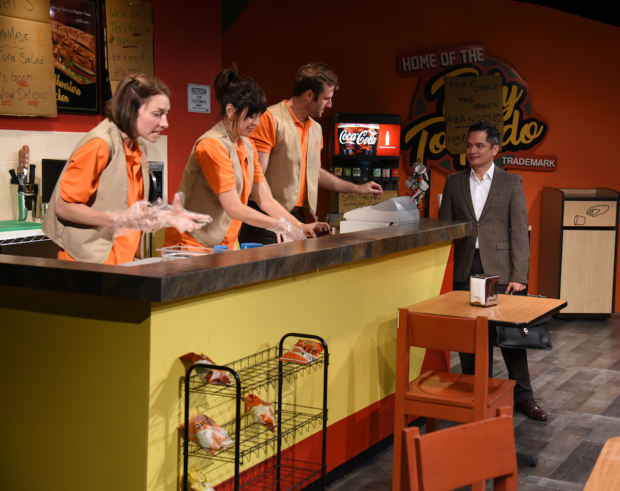Building a Better American Hero

(© Dean Cechvala)
Part of the American spirit entails taking a no-win situation and finding a road to success. The three employees of a mini-mall sandwich shop in American Hero find their situation direr by the day, but instead of giving up, they roll up their sleeves and keep making hero sandwiches, even after they run out of meat, cheese, and bread.
Sheri (Laura Mann), Ted (Graham Outerbridge), and Jamie (Anna LaMadrid) take a dead-end job at a sub franchise. Their boss, Bob (Rodney To), seems completely out of his league as an owner and manager. To train the three, he reads the binder word for word and snaps at the impatient employees when they ask reasonable questions. Bob barely shows up to the shop the first week and then disappears completely. Vendors add the store to their do-not-sell list and the employees find themselves stranded with sandwich ingredients dwindling every day. The corporate owners demand the store remain open and irate customers expecting beef and chicken bombard the harried trio. With no cavalry to save them, Sheri devises a scheme to save the store, one that may not be 100 percent legal.
The comedy has three engaging characters to keep the audience invested: Ted, who has an MBA and 20 years of experience, but now finds himself directionless after losing his job at Bank of America; Sheri, who is undereducated and balancing two low-paying jobs while caring for an ill relative (it is she who protects her coworkers and the store itself with her money-making plot); and Jamie, a single mom who has used her sexuality to relieve the boredom.
While the plot recognizes that all three characters need money to rise above their circumstances, through most of the play, their mission is to keep the doors open, not knowing if they will even get paid. Beyond that, Wohl doesn't raise the stakes to jolt the audience in any way. Which raises a question: Is money the only factor in this play? Other than that, the risks, as written, are minimal. Had the situation become more extreme, the satire would have stung more.
Luckily, the talented cast elevates the tension with their deft performances. Mann plays Sheri as a jittery mess who could be unstable, acting with eyes that dance around like she has overdosed on NoDoz. Even in early scenes, she conveys a craftiness that makes her arc credible. Outerbridge struts with his chest high, all bluster to hide vast insecurities. Once the walls start closing in on him, his character seems to live on pure adrenaline. Also putting on a façade, LaMadrid chews her gum and mounts her coworker like an overaged Lolita. Playing several different characters, including the flustered foreign Bob, an annoyed customer, and a corporate stooge, To embodies all of them with aplomb, finding the idiosyncrasies in each role.
Director James Eckhouse relays the ennui of working in a deserted store, while not allowing the stage to bore the audience. He choreographs the sandwich-making process like a dance, paying tribute to the monotony of the repeated motions. Costume designer Melissa Trn's uniforms, orange popsicle-colored shirts, and bland gray vests visually stress the job's tedium. Justin Huen's set, with faded colors (that should be warm) and overproduced food posters, reflects the dreariness of working for a carbon copy franchise.
Eckhouse turns American Hero into an enjoyable 90-minute comedy with characters in whom you want to invest. But the situations in Bess Wohl's play lack urgency. The workers of the luncheonette run out of meat early in the play and, sadly, so does the play itself.










